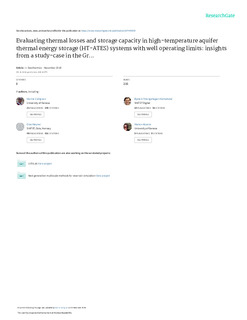| dc.contributor.author | Collignon, Marine | |
| dc.contributor.author | Klemetsdal, Øystein Strengehagen | |
| dc.contributor.author | Møyner, Olav | |
| dc.contributor.author | Alcanié, Marion | |
| dc.contributor.author | Rinaldi, Antonio Pio | |
| dc.contributor.author | Nilsen, Halvor Møll | |
| dc.contributor.author | Lupi, Matteo | |
| dc.date.accessioned | 2020-10-22T13:18:05Z | |
| dc.date.available | 2020-10-22T13:18:05Z | |
| dc.date.created | 2020-05-20T13:38:13Z | |
| dc.date.issued | 2020 | |
| dc.identifier.issn | 0375-6505 | |
| dc.identifier.uri | https://hdl.handle.net/11250/2684573 | |
| dc.description.abstract | High-temperature aquifer thermal energy storage (HT-ATES) may play a key role in the development of sustainable energies and thereby in the overall reduction of CO2 emission. To this end, a thorough understanding of the thermal losses associated with HT-ATES is crucial. We provide in this study a numerical investigation of the thermal performance of an HT-ATES system for a heterogeneous aquifer modelled after a well-defined region in the Greater Geneva Basin (Switzerland), where the excess heat produced by a nearby waste-to-energy plant is available for storage. We consider different aquifer properties and flow conditions, with complex injection strategies that respect maximum/minimum well pressures and temperatures, as well as legal regulations. Based on the results, we also draw conclusions on the economical feasibility (e.g., energy recovery factor vs. drilling costs) for the different strategies.
Our results indicate that the true behaviour of HT-ATES systems may deviate significantly from theoretical performance derived from idealised cases. This is particularly true when the operational pressure and temperature ranges of the wells are restricted, and for heterogeneous aquifers. | en_US |
| dc.language.iso | eng | en_US |
| dc.publisher | Elsevier | en_US |
| dc.rights | Attribution-NonCommercial-NoDerivatives 4.0 Internasjonal | * |
| dc.rights.uri | http://creativecommons.org/licenses/by-nc-nd/4.0/deed.no | * |
| dc.subject | Numerical Modelling | en_US |
| dc.subject | HT-ATES | en_US |
| dc.subject | Greater Geneva Basin | en_US |
| dc.title | Evaluating thermal losses and storage capacity in high-temperature aquifer thermal energy storage (HT-ATES) systems with well operating limits: insights from a study-case in the Greater Geneva Basin, Switzerland | en_US |
| dc.type | Journal article | en_US |
| dc.type | Peer reviewed | en_US |
| dc.description.version | acceptedVersion | en_US |
| dc.rights.holder | Postprint published with a CC-BY-NC-ND license | en_US |
| dc.source.volume | 85 | en_US |
| dc.source.journal | Geothermics | en_US |
| dc.identifier.doi | 10.1016/j.geothermics.2019.101773 | |
| dc.identifier.cristin | 1811917 | |
| dc.source.articlenumber | 101773 | en_US |
| cristin.ispublished | true | |
| cristin.fulltext | postprint | |
| cristin.qualitycode | 1 | |

